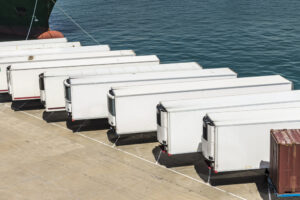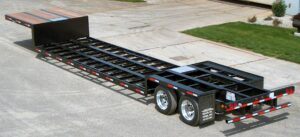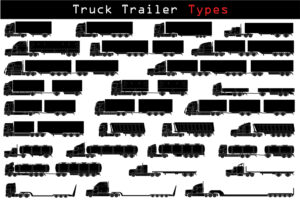The Strategic Role of Trailer Selection in the Trucking Industry
In the trucking industry, selecting the right type of trailer is pivotal for optimizing operations and adhering to legal standards, particularly concerning legal axle weight limits and gross weight. The choice of trailer significantly impacts the amount and type of cargo that can be transported, directly influencing the efficiency and profitability of logistics operations. It’s not just about the cargo space; the type of semi-trailer chosen must comply with the legal axle weight limits to prevent road damage and ensure safety. These limits are crucial as they dictate the maximum allowable weight that each axle can carry, which in turn affects the gross weight—the total weight of the vehicle, including the cargo, fuel, and the vehicle itself. Adhering to these regulations not only avoids legal penalties but also plays a role in maintaining the infrastructure and ensuring road safety.
Semi-trailers come in various designs and capacities, each tailored to specific logistical needs. From flatbeds suitable for oversized loads to refrigerated trailers for perishable goods, the diversity in semi-trailer variants allows for a broad range of logistical operations. Critical metrics such as cargo weight, Maximum Gross Vehicle Weight (MGVW), trailer length, and dimensions become key considerations in trailer selection. These factors determine not only the type and volume of cargo that can be legally and safely transported but also influence route planning and fuel efficiency. Understanding these metrics and how they interact with each other and with regulatory requirements is essential for logistics planners and truck operators, ensuring that the chosen semi-trailer variant aligns with the operational goals while meeting legal and safety standards.

Comparative Analysis of Trailer Types:
Dry Van Trailer: The Backbone of General Freight Transport
Dry van trailers are essential to the freight transportation industry, providing a secure and enclosed environment for a wide variety of goods, from consumer products to non-perishable foods. Their design adheres to strict dimensions and weight capacities to comply with legal axle weight limits and gross weight regulations, ensuring safe and legal operation, particularly for semi-trucks and tractor-trailers. However, the fixed structure of dry vans imposes limitations on the size and shape of cargo they can carry, and adherence to weight regulations may restrict payload capacity for heavier items. Despite these constraints, dry vans remain a critical tool in logistics, best suited for goods that fit within their physical and regulatory boundaries, underscoring their indispensable role in efficient goods transportation. Learn more about dry van trailers here!
Standard Double Drop Trailer: Engineered for Heightened Cargo
Standard double drop trailers are engineered with unique design features to accommodate heightened cargo, making them ideal for transporting oversized items that exceed the height limitations of conventional trailers. These trailers are characterized by a distinct lower deck section, which allows for the transportation of tall goods, such as industrial machinery or construction equipment, within legal height restrictions on roads. The specifications of double drop trailers, including their dimensions and weight handling capacities, are tailored to optimize the safe and efficient transport of large items, ensuring they meet both legal and operational requirements.
While these trailers offer significant advantages in terms of their ability to carry tall cargo, they also face challenges related to weather exposure, as the open design of the lower deck section can leave cargo vulnerable to adverse weather conditions. Despite this, the specialized design of double drop trailers provides a critical solution for the logistics of oversized items, balancing the accommodation of unique cargo sizes with the inherent challenges of open-deck transportation.

Refrigerated Trailer: (Reefer)
Refrigerated trailers, or “reefers,” are designed with advanced cooling systems to transport perishable goods under controlled temperatures, making them essential for the food, pharmaceutical, and floral industries. These trailers are built to specific dimensions and weight handling capacities to ensure the efficient and safe transport of temperature-sensitive cargo, adhering to stringent industry standards and regulations. The primary advantage of refrigerated trailers lies in their ability to maintain a consistent temperature, safeguarding the quality and safety of perishable goods over long distances. However, the use of refrigerated trailers presents challenges, including the higher operational costs associated with maintaining the cooling systems and the increased fuel consumption compared to standard trailers. Despite these challenges, the critical role of refrigerated trailers in the supply chain is undeniable, providing a vital link in ensuring the freshness and integrity of perishable products from origin to destination.

Flatbed Trailers
Flatbed trailers are distinguished by their open deck design, offering versatility and ease of loading for a broad range of cargo, particularly oversized items or machinery that cannot be easily accommodated by enclosed trailers. Their specifications, including dimensions and weight handling capacities, are crafted to cater to a diverse set of transportation needs, allowing for the carriage of heavy and irregularly shaped goods while adhering to legal weight limits. The key advantage of flatbed trailers lies in their accessibility and flexibility, enabling loading and unloading from any side, which is particularly beneficial for construction materials, large equipment, and other bulky items. However, the open nature of these trailers presents challenges, notably the vulnerability of the cargo to adverse weather conditions and the need for meticulous securing to prevent load shifting during transit. Despite these challenges, flatbed trailers remain a preferred choice for specific freight requirements, offering a practical solution for transporting large and heavy cargo with efficiency.
Exploration of Additional Trailer Variants
Extendable double drop trailers represent a specialized variant within the trucking industry, catering to niche applications that require the transportation of exceptionally long or heavy cargo. These trailers are designed with an extendable feature that allows for the adjustment of their length to accommodate various sizes of freight, particularly those that exceed the standard dimensions of traditional trailers. The design of extendable double drop trailers is focused on providing a solution for transporting oversized loads, such as construction beams or large machinery, while still adhering to the legal gross weight and maximum weight limits imposed on tractor-trailers. This adaptability makes them an invaluable asset for specific logistical challenges, offering the flexibility to handle a wide range of cargo sizes without compromising on safety or regulatory compliance. Despite their specialized nature, the use of extendable double drop trailers underscores the trucking industry’s capacity to innovate and meet diverse transportation needs, ensuring the efficient delivery of oversized items across different sectors.

Core Factors for Trailer Comparison:
Cargo Weight & Maximum Gross Vehicle Weight Considerations:
Aligning a trailer’s capacity with the specific requirements of the cargo and the truck’s specifications is fundamental in the logistics sector, ensuring the total weight remains within the maximum gross vehicle weight permitted by law. This process necessitates a careful examination of the weight capacities offered by various types of trailers, such as flatbeds, dry vans, and specialized extendable double drop trailers, each designed to handle different cargo types and weights. Selecting the appropriate trailer involves not just matching the cargo’s physical dimensions but also considering the weight distribution and maximum load capacity to prevent overloading and ensure safe transportation.
Legal weight restrictions play a pivotal role in shaping trucking operations, as non-compliance can lead to significant penalties, increased costs, and potential safety hazards. These regulations are in place to protect infrastructure and ensure road safety, making adherence to them a critical aspect of logistical planning. Trucking companies must stay informed about these legal limits and incorporate them into their operational strategies, choosing trailers that not only accommodate the cargo’s size and weight but also adhere to these legal constraints, thereby optimizing the efficiency and legality of their transport operations.
Trailer Length & Dimensional Constraints:
The size of a trailer plays a crucial role in determining both the volume of cargo it can carry and its maneuverability on the road. Larger trailers offer increased cargo volume, allowing for the transportation of more goods in a single trip, which can enhance operational efficiency. However, the added length and dimensions can also impact the trailer’s maneuverability, making it more challenging to navigate through tight spaces, urban areas, and during loading and unloading operations. A comparative analysis of trailer lengths and dimensions across different types, such as flatbeds, refrigerated trailers, and dry vans, reveals a wide range of options tailored to specific cargo needs and transportation environments.
Navigating legal length restrictions is essential in logistical planning, as these regulations vary by region and can significantly affect route planning and permit requirements. Compliance with these legal parameters ensures the legality of transport operations and avoids potential penalties. Understanding the implications of trailer dimensions on both cargo capacity and maneuverability, in conjunction with adhering to legal constraints, is crucial for optimizing logistical operations. It requires a strategic approach to trailer selection, ensuring that the chosen trailer not only meets the cargo’s dimensional needs but also aligns with legal and operational requirements for efficient and compliant transportation.

Additional Considerations:
When selecting a trailer, considerations extend to loading/unloading convenience, weather protection, and security features, which are crucial for operational efficiency and cargo safety. Trailers equipped with accessibility features like drop-deck designs or liftgates streamline the loading and unloading process, saving time and labor, especially vital for high-volume or delicate cargo handling. Weather protection is another key factor; enclosed trailers offer the best defense against environmental elements, essential for sensitive or perishable goods, whereas open trailers, such as flatbeds, suit oversized or irregularly shaped loads but may require additional weatherproofing measures. Moreover, enhanced security features, including robust locking mechanisms and tracking systems, are indispensable for safeguarding cargo against theft or tampering. These considerations collectively inform a comprehensive trailer selection process, ensuring the chosen solution not only fits logistical needs but also adequately protects and secures the cargo throughout its journey.

Navigating the Decision: Selecting the Ideal Trailer
Navigating the decision to select the ideal trailer involves key considerations that encompass aligning trailer types with specific cargo and route requirements and consulting industry experts for tailored advice. It’s essential to evaluate the nature of the cargo, its size, weight, and any special handling needs, alongside the intricacies of the intended route, including road conditions and legal restrictions. This thorough assessment ensures that the chosen trailer type, whether it be a flatbed, refrigerated, or specialized variant, is perfectly suited to the cargo’s characteristics and the logistical challenges of the journey. Furthermore, leveraging the insights of industry experts can provide valuable, customized guidance, drawing on their experience and knowledge to navigate the complexities of trailer selection. This holistic approach to decision-making facilitates the identification of an optimal trailer solution that meets both operational demands and regulatory compliance, ensuring efficient and safe transportation of goods.

Conclusion
In conclusion, selecting the right trailer is crucial for operational efficiency and safety in the trucking industry. ShipEX Logistics excels in matching clients with the ideal carrier and trailer for their specific shipping needs. With a focus on diverse trailer types, from flatbeds to refrigerated and extendable double drop trailers, ShipEX Logistics ensures a perfect fit for every cargo’s unique requirements. This streamlined approach not only guarantees safe and efficient transport but also enhances the logistics experience, positioning ShipEX Logistics as a trusted partner in navigating the complexities of modern freight transportation.






